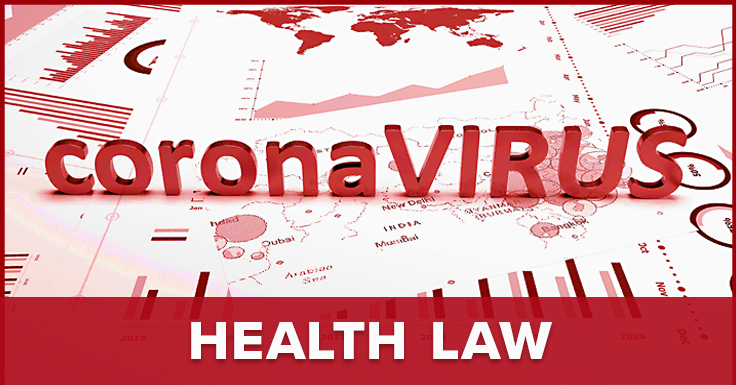Showing 80 posts in Hospitals.
DHHS Revises and Clarifies Guidelines for Patients’ Informed Consent When Providing Sensitive Medical Care
 In recent years, Michigan has been home to two of the largest sexual abuse scandals involving doctors in history: the sexual abuse committed by Larry Nassar while employed by Michigan State University and the sexual abuse committed by Robert Anderson while employed by the University of Michigan. In both circumstances, the former doctors carried out their sexual abuse under the guise of medical procedures and without the informed consent of their targets. Michigan is not alone in being home to these types of sexual abuse scandals as similar acts have been alleged to have been committed by many other health care providers, such as Richard Strauss (Ohio State University), George Tyndall (University of Southern California), Derrick Todd (Bringham and Women’s Faulkner Hospital (Boston, MA)), Major Michael Stockin (United States Army), amongst others. Read More ›
In recent years, Michigan has been home to two of the largest sexual abuse scandals involving doctors in history: the sexual abuse committed by Larry Nassar while employed by Michigan State University and the sexual abuse committed by Robert Anderson while employed by the University of Michigan. In both circumstances, the former doctors carried out their sexual abuse under the guise of medical procedures and without the informed consent of their targets. Michigan is not alone in being home to these types of sexual abuse scandals as similar acts have been alleged to have been committed by many other health care providers, such as Richard Strauss (Ohio State University), George Tyndall (University of Southern California), Derrick Todd (Bringham and Women’s Faulkner Hospital (Boston, MA)), Major Michael Stockin (United States Army), amongst others. Read More ›
Categories: Health Care Reform, Hospitals, Lawsuit, Medicare/Medicaid, Privacy
CMS Guidance Ends Waivers for COVID-19
 On April 7, the Centers for Medicare & Medicaid Services (CMS) issued an update to the COVID-19 emergency declaration blanket waivers for specific providers. The memorandum, which was issued by the Director of the Quality, Safety & Oversight Group, details the numerous changes that will take place within 30 or 60 days of the memorandum’s publication. Read More ›
On April 7, the Centers for Medicare & Medicaid Services (CMS) issued an update to the COVID-19 emergency declaration blanket waivers for specific providers. The memorandum, which was issued by the Director of the Quality, Safety & Oversight Group, details the numerous changes that will take place within 30 or 60 days of the memorandum’s publication. Read More ›
Categories: Alerts and Updates, Health Care Reform, Hospitals, Medicare, Medicare/Medicaid
Update to CMS Guidance on Shared Health Care Facilities
 The Centers for Medicare & Medicaid Services (CMS) have recently released updated guidance regarding hospital co-locations arrangements. After nearly two years of deliberations and revisions, the final Guidance for Hospital Co-location with Other Hospitals or Health Care Facilities (the “Final Guidance”) was released on November 12, 2021 and took effect immediately upon publication. The Final Guidance is meant to address how CMS and other state agency surveyors will evaluate how hospitals share their space, services, and staff. Read More ›
The Centers for Medicare & Medicaid Services (CMS) have recently released updated guidance regarding hospital co-locations arrangements. After nearly two years of deliberations and revisions, the final Guidance for Hospital Co-location with Other Hospitals or Health Care Facilities (the “Final Guidance”) was released on November 12, 2021 and took effect immediately upon publication. The Final Guidance is meant to address how CMS and other state agency surveyors will evaluate how hospitals share their space, services, and staff. Read More ›
Categories: Health Care Reform, Hospice, Hospitals, Medicaid Planning, Medicare, Medicare/Medicaid
Health Care Providers Face Growing Ransomware Risks, and Potential Sanctions for Paying Ransom
 As if COVID-19 wasn’t enough of a challenge for many struggling hospitals and health care systems, there is another growing threat they must guard against: cyberattacks.
As if COVID-19 wasn’t enough of a challenge for many struggling hospitals and health care systems, there is another growing threat they must guard against: cyberattacks.
On October 28, 2020, the FBI, Department of Health and Human Services, and Cybersecurity and Infrastructure Security Agency issued a report warning of "an increased and imminent cybercrime threat" to U.S. hospitals and health care providers. Read More ›
Categories: Cybersecurity, Electronic Health Records, Hospice, Hospitals
Extension of Visitor Restrictions for Health Care and Residential Care Facilities
 On July 23, 2020, Governor Whitmer issued Executive Order 2020-156, which extends the current restrictions limiting the visitors allowed at health care facilities, residential care facilities, congregate care facilities, and juvenile justice facilities. Executive Order 2020-136 and its predecessors initially imposed these restrictions on visitors permitted to such facilities. Executive Order 2020-156 extends the restrictions through August 31, 2020. Read More ›
On July 23, 2020, Governor Whitmer issued Executive Order 2020-156, which extends the current restrictions limiting the visitors allowed at health care facilities, residential care facilities, congregate care facilities, and juvenile justice facilities. Executive Order 2020-136 and its predecessors initially imposed these restrictions on visitors permitted to such facilities. Executive Order 2020-156 extends the restrictions through August 31, 2020. Read More ›
Categories: Hospice, Hospitals
Scope of Practice, Delegation, and Supervision Requirements for Health Professionals Caring for COVID-19 Patients Reinstated
 In response to the improvements in hospitals’ and health care professionals’ capacity to care for COVID-19 patients, Governor Whitmer has rescinded Executive Order 2020-61, which temporarily suspended the scope of practice, supervision, and delegation restrictions for many health care providers during the initial surge of cases in March. Read More ›
In response to the improvements in hospitals’ and health care professionals’ capacity to care for COVID-19 patients, Governor Whitmer has rescinded Executive Order 2020-61, which temporarily suspended the scope of practice, supervision, and delegation restrictions for many health care providers during the initial surge of cases in March. Read More ›
Updates to Michigan Nursing Home COVID-19 Regulatory Requirements
 Through Executive Order 2020-136, Governor Whitmer has extended the duration of restrictions on the entry of visitors into health care facilities and residential care facilities. These restrictions were originally imposed through Executive Order 2020-72 and extended through Executive Order 2020-108. Executive Order 2020-136 now extends the restrictions through July 24, 2020. Read More ›
Through Executive Order 2020-136, Governor Whitmer has extended the duration of restrictions on the entry of visitors into health care facilities and residential care facilities. These restrictions were originally imposed through Executive Order 2020-72 and extended through Executive Order 2020-108. Executive Order 2020-136 now extends the restrictions through July 24, 2020. Read More ›
Categories: Hospice, Hospitals
New Requirements for Hospital Discharge and Long-Term Care Facility Residents
 On May 20, 2020, Governor Gretchen Whitmer issued Executive Order 2020-95, which updates precautionary and notification requirements for long-term care facilities to protect residents and employees from the spread of COVID-19. Executive Order 2020-95 rescinds Executive Order 2020-84, which provided initial protections for long-term care residents. “Long-term care facility” includes a nursing home, home for the aged, adult foster care facility, or assisted living facility. Read More ›
On May 20, 2020, Governor Gretchen Whitmer issued Executive Order 2020-95, which updates precautionary and notification requirements for long-term care facilities to protect residents and employees from the spread of COVID-19. Executive Order 2020-95 rescinds Executive Order 2020-84, which provided initial protections for long-term care residents. “Long-term care facility” includes a nursing home, home for the aged, adult foster care facility, or assisted living facility. Read More ›
Categories: Hospice, Hospitals, Long-Term Care
Provider Relief Fund: Changes in Calculation Result in Potential Overpayment
 The Provider Relief Fund was established through the Coronavirus Aid, Relief and Economic Security (CARES Act) to support health care providers facing lost revenue and increased expenses relating to COVID-19. Within the Provider Relief Fund, certain amounts are allocated for various types of providers. For example, there are specific allocations to hospitals, rural hospitals, and providers treating uninsured patients for COVID-19. Additionally, $50 billion was allocated for general distribution to providers. Of the $50 billion, the first $30 billion was quickly disbursed to facilities and providers who received Medicare fee-for-service reimbursements in 2019. The remaining $20 billion of the general distribution was distributed beginning on April 24, 2020. Read More ›
The Provider Relief Fund was established through the Coronavirus Aid, Relief and Economic Security (CARES Act) to support health care providers facing lost revenue and increased expenses relating to COVID-19. Within the Provider Relief Fund, certain amounts are allocated for various types of providers. For example, there are specific allocations to hospitals, rural hospitals, and providers treating uninsured patients for COVID-19. Additionally, $50 billion was allocated for general distribution to providers. Of the $50 billion, the first $30 billion was quickly disbursed to facilities and providers who received Medicare fee-for-service reimbursements in 2019. The remaining $20 billion of the general distribution was distributed beginning on April 24, 2020. Read More ›
MDHHS Issues Guidance on Patient Care for Michigan Health Care Providers
 On May 3, 2020, the Michigan Department of Health and Human Services (MDHHS) provided guidance on the best practices for continued compliance with Executive Order 2020-17. Executive Order 2020-17 implemented temporary restrictions on non-essential medical and dental procedures as of March 21, 2020. Executive Order 2020-17 required all hospitals, freestanding surgical outpatient facilities, dental facilities, and state operated outpatient facilities (collectively, “covered facilities”) to temporarily postpone all non-essential medical and dental procedures until the state of emergency in Michigan is lifted. Currently, the state of emergency is set to continue through May 28, 2020 under Executive Order 2020-68. Read More ›
On May 3, 2020, the Michigan Department of Health and Human Services (MDHHS) provided guidance on the best practices for continued compliance with Executive Order 2020-17. Executive Order 2020-17 implemented temporary restrictions on non-essential medical and dental procedures as of March 21, 2020. Executive Order 2020-17 required all hospitals, freestanding surgical outpatient facilities, dental facilities, and state operated outpatient facilities (collectively, “covered facilities”) to temporarily postpone all non-essential medical and dental procedures until the state of emergency in Michigan is lifted. Currently, the state of emergency is set to continue through May 28, 2020 under Executive Order 2020-68. Read More ›
Categories: Compliance, Health Care Reform, Hospice, Hospitals
Categories
- Department of Labor
- Labor Relations
- Compliance
- Affordable Care Act
- Criminal
- Medicare
- Employment
- Physicians
- Pharmacy
- News & Events
- Regulations
- News
- Digital Assets
- HITECH Act
- Providers
- Lawsuit
- Medicare/Medicaid
- Retirement
- Privacy
- Regulatory
- Legislative Updates
- Insurance
- Did you Know?
- Licensing
- Hospice
- Employee Benefits
- Technology
- Cybersecurity
- Tax
- Medicaid Planning
- Billing/Payment
- Alerts and Updates
- Patents
- Audits
- Health Insurance Exchange
- Electronic Health Records
- Health Care Reform
- Accountable Care Organizations
- COVID-19 and Workers' Compensation
- Contracts
- Workers' Compensation
- 6th Circuit Court of Appeals
- HIPAA
- Long-Term Care
- Hospitals
- Fraud & Abuse
Best Lawyers® 2021
Congratulations to the attorneys of the Health Care practice group at Foster Swift Collins & Smith, PC for their inclusion in the Best Lawyers in America 2021 edition. Firm-wide, 44 lawyers were listed. Best Lawyers lists are compiled based on an exhaustive peer-review evaluation and as lawyers are not required or allowed to pay a fee to be listed; inclusion in Best Lawyers is considered a singular honor. Health Care practice group members listed in Best Lawyers are as follows:
- Jennifer B. Van Regenmorter, Holland
To see the full list of Foster Swift attorneys listed in Best Lawyers 2021, click here.



 Share
Share